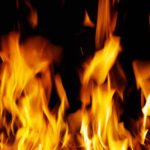
Nobody likes to think about the idea of a fire occurring in their home. Unfortunately, however, house fires do happen and when they do they can be devastating to the property where they occur and to the occupants of said property.
Fires, after all, can cause untold damage to any kind of home not to mention pose a very real threat to health and even to life. Anything which can reduce the risk of fire in the home, therefore, is something that any responsible homeowner should devote some time to thinking about. The following are four important areas of consideration to help get you started.
Smoke Alarms
Perhaps the quickest, simplest and easiest way that you can reduce the fire risk in your home is by installing and properly maintaining smoke alarms.
For optimum efficiency and protection, you should have at least one smoke alarm on each level of your home. It is also crucial to test each alarm on a weekly basis and to replace their batteries annually, even if the alarm hasn’t notified you that the battery is running out.
What’s more, it should only be when you are putting new batteries in, that you remove the existing batteries from the alarm. No matter how annoying the alarm may be if it goes off while you’re making toast, after all, if you forget to put the batteries back in afterwards you make your home considerably less safe.
Electrical Sockets
We all love our electronic devices these days, but it’s crucial to be sensible when it comes to plugging them in, if we want to keep our homes safe from fire. Malfunctioning or overheating electrical sockets are an all too common cause of house fires.
In order to mitigate that risk in your home, it is firstly important not to plug too many appliances into one socket. Overloading a socket, after all, is an easy way to lead it to overheat. It is also equally important not to plug in or to use an appliance with a damaged or old cable or a poorly wired plug, even if it appears to still be working fine.
Smoking at Home
Smoking in the home is one of the leading causes of house fires, so if you are a smoker it’s important to keep safety in mind when lighting up at home.
First and foremost, you should never smoke when in bed or otherwise liable to fall asleep (i.e. if you’ve been drinking). In the same vein, you should also never leave a lit cigarette, cigar or pipe unattended even for a short amount of time. Finally, it’s also crucial to keep cigarettes, lighters and other smoking paraphernalia out of the reach of children.
Kitchen Safety
It should hardly come as a surprise that the kitchen is an all too common source of fires in the home. There are, however, a number of simple ways to make your kitchen much safer and such fires much less likely.
Pans being heated on the hob, especially if using oil, should firstly never be left unattended and should be turned off if something else takes your attention. Extractor fans and other ventilation equipment, too, should be checked regularly for faults or blockages.
Perhaps less obviously, the placement and use of items such as tea towels and oven gloves is also important. These items should never be left close to hot hobs or open flames, and for the same reason, you should also avoid wearing loose or baggy clothing when cooking.
Finally, it may also be prudent to invest in safety equipment such as a fire blanket to install in your kitchen, in case of emergency.




